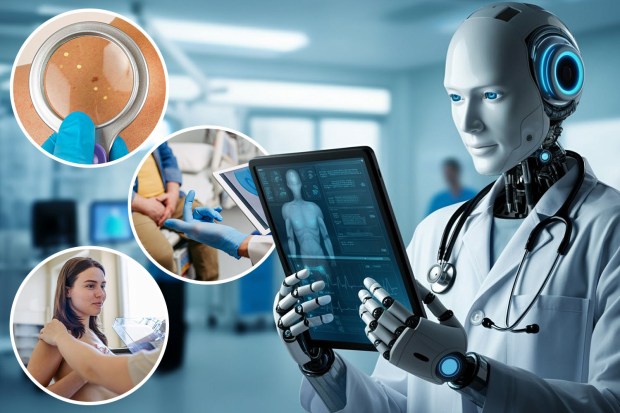Science
AI Revolutionizes Cancer Care with Faster Diagnosis and New Treatments

Artificial intelligence (AI) is transforming cancer care, leading to faster diagnoses and innovative treatments. In a recent initiative, the NHS announced the use of AI tools on an “unprecedented scale” to enhance patient care. This technology aims to improve the speed and accuracy of cancer detection, significantly impacting the lives of millions.
One of the most notable developments involves a trial with 700,000 women to identify potential signs of breast cancer. Additionally, new research suggests that AI could soon detect throat cancer through voice analysis. Last week, scientists reported progress on an AI-modeled personalized vaccine for melanoma, underscoring the growing role of technology in cancer treatment.
AI Enhances Research and Early Detection
AI’s capability to process vast amounts of data is revolutionizing cancer research. For instance, laboratories analyze extensive genetic data to uncover patterns that may lead to effective treatments. Professor Nuria Lopez-Bigas from Spain’s Institute for Research in Biomedicine highlighted the speed at which AI can analyze mutations in tumors. She explained that previously, researchers would guess which mutations to target, a slow process. Now, AI enables the analysis of thousands of tumors globally, identifying which mutations drive cancer, thus accelerating research timelines significantly.
In another instance, King’s College London utilized ChatGPT-4 to discover new drug combinations for breast cancer. The AI system suggested twelve untested combinations, seven of which showed promise in laboratory tests. The Institute for Cancer Research has trained AI to assess how different medications alter cancer cell structures, achieving a remarkable accuracy rate of 99%. This advancement could reduce the duration of pre-human testing from three years to just three months.
Transforming Diagnosis in Hospitals
AI is already being integrated into hospital settings, proving invaluable for early cancer detection. For instance, AI systems can analyze images and scans at a pixel level, identifying abnormalities that human eyes might miss. The National Institute for Health and Care Excellence (NICE) has encouraged hospitals to implement AI technologies for mole checks. A system named DERM compares smartphone photos of moles against a large database, aiding doctors in determining malignancy.
Hospitals are also testing AI’s potential for detecting lung, breast, and prostate cancers. AI’s ability to compare new patient data with extensive historical records allows for rapid diagnosis. Dr. Joe Barnett, a radiologist at the Royal Free NHS Trust in London, noted that AI dramatically enhances lung cancer screening. The technology enables the detection of potential masses quickly, allowing radiologists to focus on assessing cancer risks rather than searching for abnormalities.
A significant two-year study involving 3,000 men will evaluate AI technology for prostate cancer detection, focusing on identifying smaller MRI abnormalities effectively. Meanwhile, researchers at Oregon Health and Science University have developed an algorithm that detects early signs of throat cancer through voice recordings.
AI’s Role in Personalized Patient Care
While AI cannot yet perform cancer treatments, it supports doctors in making informed decisions. The focus has shifted towards “precision,” “personalized,” and “tailored” treatments based on individual patient data. This approach aims to minimize side effects and enhance remission rates but introduces a complex array of treatment options for physicians.
The American Society of Clinical Oncology launched an AI tool that assists doctors in selecting treatment plans based on the latest research. Dr. Julie Gralow, a breast cancer specialist and President of the Association for Clinical Oncology, emphasized that AI will not replace oncologists but will be essential for those who wish to remain at the forefront of cancer care.
Moreover, AI can simulate treatment effects on “virtual patients,” allowing for better predictions of therapy outcomes. A study from Oxford University demonstrated AI’s capability to safely adjust medication doses and track patient responses in real time. The incorporation of AI into surgical robots is also on the rise, with companies like Intuitive leveraging AI to enhance surgical precision and feedback mechanisms.
As cancer care continues to evolve, AI’s integration promises to streamline processes and improve patient outcomes. The Cancer Research Institute describes the partnership between AI and cancer treatment as an “emerging revolution.” Professor Lopez-Bigas expressed optimism, stating, “I have a feeling that the biggest leap is yet to come.”
Regular screenings remain crucial in the fight against cancer. The NHS offers three national screening programs—cervical, breast, and bowel screening—to detect cancer early. These initiatives improve the likelihood of successful treatment, urging eligible individuals to participate actively.
In summary, the intersection of AI and cancer care is paving the way for groundbreaking advancements that could ultimately save lives and reshape the future of medical treatment.
-

 World2 weeks ago
World2 weeks agoCoronation Street’s Shocking Murder Twist Reveals Family Secrets
-

 Entertainment1 week ago
Entertainment1 week agoAndrew Pierce Confirms Departure from ITV’s Good Morning Britain
-

 Entertainment5 months ago
Entertainment5 months agoKate Garraway Sells £2 Million Home Amid Financial Struggles
-

 Entertainment4 months ago
Entertainment4 months agoAnn Ming Reflects on ITV’s ‘I Fought the Law’ Drama
-

 Entertainment1 month ago
Entertainment1 month agoCoronation Street Fans React as Todd Faces Heartbreaking Choice
-

 Health4 months ago
Health4 months agoKatie Price Faces New Health Concerns After Cancer Symptoms Resurface
-

 World1 month ago
World1 month agoBailey Announces Heartbreaking Split from Rebecca After Reunion
-

 Entertainment2 weeks ago
Entertainment2 weeks agoTwo Stars Evicted from I’m A Celebrity Just Days Before Finale
-

 Entertainment4 months ago
Entertainment4 months agoCoronation Street’s Carl Webster Faces Trouble with New Affairs
-

 World2 weeks ago
World2 weeks agoKevin Sinfield Exceeds Fundraising Goal Ahead of Final Marathons
-

 Entertainment4 months ago
Entertainment4 months agoWhere is Tinder Swindler Simon Leviev? Latest Updates Revealed
-

 Entertainment5 months ago
Entertainment5 months agoMarkiplier Addresses AI Controversy During Livestream Response





















